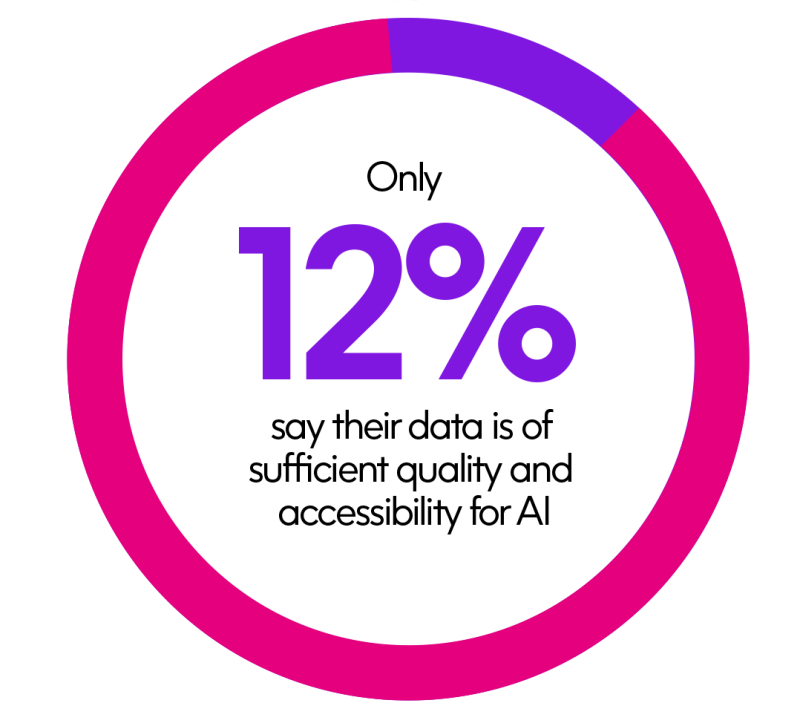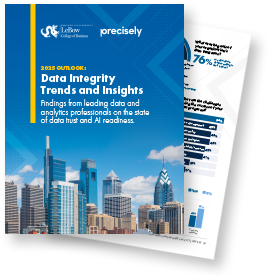
Must-Know Data Integrity Trends for 2025

New year, new data-driven opportunities to unlock.
In 2025, it’s more important than ever to make data-driven decisions, cut costs, and improve efficiency – especially in the face of major challenges due to higher manufacturing costs, disruptive new technologies like artificial intelligence (AI), and tougher global competition.
But overcoming these obstacles is easier said than done, as evidenced by key findings from the 2025 Outlook: Data Integrity Trends and Insights report, published in partnership between Precisely and the Center for Applied AI and Business Analytics at Drexel University’s LeBow College of Business.
More than 550 leading data and analytics professionals worldwide were surveyed for this report, and the findings reveal a variety of must-know trends as you continue to fine-tune your data strategy this year.
From AI readiness to operational efficiency and beyond, see what’s trending among your peers and in the data integrity space at large in 2025 when you read the full report. In the meantime, read on for a recap of the highlights.

Key Data Integrity Trends and Insights for 2025
1. AI success is impacted by a lack of data readiness
The potential of AI has had the business world buzzing – and for good reason. And yet, only 12% of organizations report that their data is of sufficient quality and accessibility for effective AI implementation.
When you consider that 60% of organizations in our survey say that AI is a key influence on their data programs (up 46% from our 2023 survey), it’s clear that strategic investments must be made to ensure their data is ready to fuel AI’s fullest potential.

What are the primary data challenges blocking the path to AI success? Data governance tops the list, according to 62% of survey respondents. This is unsurprising, given the role that data governance programs play in ensuring that accurate, reliable, and ethical data is used to train models – including where it’s stored, its lineage, who has access to it, and more.
In addition to concerns about the governance of data:
- 54% reported a lack of data attributes necessary for relevant AI outcomes
- 52% had concerns about the quality of the data used for model training and inference
- 50% had privacy and security issues
- 41% had an insufficient quantity of data to prevent bias
This overall lack of data readiness for AI is a major roadblock in an area that promises to revolutionize business operations.
2. Resource shortages challenge data success – particularly for AI
Recent years have shown that a shortage of specialized skills necessary for data management, analytics, and AI is a growing obstacle for organizations – and this is perhaps one of the most pressing challenges highlighted by our survey.
In our survey, 42% of respondents say that a shortage of skills and resources is one of the biggest challenges facing the success of their data programs, an increase from 37% in 2023. That number jumps to 60% when asked specifically about obstacles to AI readiness, making it clear that the scarcity of skilled professionals makes it difficult for organizations to fully capitalize on their data assets and implement effective AI solutions.
3. Data quality remains the top data integrity challenge and priority
Do data quality struggles prevent your organization from achieving data integrity and the benefits that come with it? You’re not alone.
Challenges with data quality and trust have been recurring themes across our research, and as we start a new year, this is no different: a major takeaway from this study is that 76% of organizations say data-driven decision-making is a top goal for their data programs, yet 67% still don’t completely trust the data they rely on for these decisions.
Data quality was the top data integrity challenge for 64% of organizations in 2024, up from 50% in 2023. The most common barriers to achieving high-quality data include:
- lack of adequate tools for automating data quality processes (49%)
- inconsistent data definitions and formats (45%)
- data volume (43%)

Given the negative impact of poor-quality data on overall data trust, it makes sense that data quality will continue to be a primary focus for organizations – so much so, that it’s the top-cited priority for investment.
Data governance adoption has risen dramatically
Reports that data governance presents an obstacle to data integrity have grown a dramatic 89%, up from 27% in 2023 to 51% in 2024. In fact, it’s second only to data quality.
It’s not surprising, then, that data governance adoption has also increased. Seventy-one percent (71%) in our survey say they have a data governance program in place, compared to 60% in 2023.
What makes data governance’s role so pivotal? The benefits speak for themselves – when asked about the outcomes of their data governance program investments, organizations reported:
- improved data quality, and improved quality of data analytics and insights (58% each)
- increased collaboration (57%)
- increased regulatory compliance (50%)
- faster access to relevant data (36%)
Pressure to reduce costs and optimize operational efficiency
Operational efficiency stands as another major priority, with 75% of respondents highlighting it as a key focus for their data initiatives. As businesses face mounting cost pressures, the need to streamline operations and cut expenses becomes increasingly urgent.
However, funding for data programs is a significant challenge, cited by 54% of participants as their biggest hurdle.
This financial strain underscores the need for businesses to invest strategically in data initiatives that promise the highest returns in efficiency and cost savings.
2025 Outlook: Essential Data Integrity Insights
What’s trending in trusted data and AI readiness for 2025? The results are in!

Data enrichment and location intelligence emerge as key data initiatives
The survey also reveals a notable increase in spatial analytics and data enrichment adoption – in line with a prediction from our 2023 report regarding the emergence of these areas as business-critical technologies.
Sixty-seven percent (67%) of organizations say they use location intelligence for a for a variety of valuable use cases, with top examples including:
- validating, standardizing, and improving address data quality (34%)
- optimizing product and service delivery (31%)
- targeted marketing with customer demographics and segmentation (27%)
- fraud detection (24%)
Overall, 21% of organizations cite spatial analytics as a data integrity priority – a 62% increase from 2023, when only 13% of respondents called it a priority.
The use of third-party information to enrich address data has also seen a rise as businesses seek to enhance innovation, operational efficiency, and competitive advantage. The rich context provided through data enrichment has an essential role to play in this journey.
Data enrichment is a data integrity priority for 28% of organizations, up from 23% in 2023.
While these advancements offer valuable insights and operational improvements, they come with their own set of challenges. Broader adoption is slowed by issues related to cost, data quality, and integration ease, along with growing privacy and security concerns.
Dive Deeper into Strategic, Actionable Data Integrity Insights
Which of these top findings resonate the most with your organization’s goals and challenges for this year?
Ultimately, to directly overcome challenges and remain competitive, it’s critical to align your data initiatives to your business strategy, enhance data quality and governance practices, and address skills gaps. As AI continues to reshape the business landscape, those who can effectively leverage high-integrity data and skilled talent will be better positioned to drive innovation and achieve operational excellence.
Ready to power bigger data-driven wins this year? Get your copy of the 2025 Outlook: Data Integrity Trends and Insights report to unlock valuable insights to elevate your data strategy – and, see how your data program and level of AI readiness compare to your peers’.


